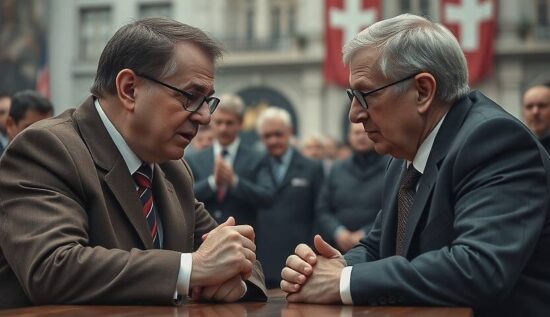Today, a meeting between the leader of the Freedom Party of Austria (FPÖ), Herbert Kickl, and President Alexander Van der Bellen could hold the key to the country’s future. The focus will be on the current challenges facing the country and the question of forming a government.
The FPÖ, as the strongest party in the recent national elections, is asserting its claim to form the government. This leadership claim is deeply rooted in Austria’s political tradition.
However, President Van der Bellen has so far hesitated to grant the FPÖ the mandate to form a government. “It has always been the custom for the strongest party to receive the mandate” explained economic expert Walter Schönthaler in an interview.
“If Van der Bellen continues to hesitate, he risks giving the impression that he is disregarding the will of the voters” Schönthaler added.
Van der Bellen’s delay is seen by some as an attempt to reduce political polarization in the country. However, critics argue that he is not fulfilling his constitutional role. Schönthaler hopes that today’s meeting will lead to a clarification:
“Perhaps the President has a new strategy that will lead the country out of its political stalemate.”
The meeting takes place at a time when Austria is facing significant economic challenges, including bureaucracy, over-regulation, and a stagnation of economic growth, which dominate the public debate. Schönthaler expressed his concern:
“The last five years have been economically a step backward. Austria has gone from being a model country to a state that no longer uses its opportunities.”
Small and medium-sized enterprises, the backbone of the Austrian economy, are particularly suffering from a policy that, in their view, fails to take their needs into account.
“We need a government that has the courage to dismantle bureaucracy and relieve the middle class. This is not only an economic, but also a social necessity” emphasized Schönthaler.
Whether today’s meeting will indeed bring about a turning point remains to be seen. If Van der Bellen were to grant the FPÖ the mandate to form a government, it could signal that the political deadlock has been overcome. However, such a step would not be without risk: Van der Bellen would have to rely on the FPÖ’s ability to form a stable and consensus-based government.
Otherwise, the political crisis could escalate further. The FPÖ would vigorously defend its leadership claim, and public discontent with the political class would likely continue to grow. “Democratic principles must take precedence” Schönthaler warned.
“Only then can trust in the institutions be restored.”
Today’s meeting between Kickl and Van der Bellen could be more than just a routine political event. It is a moment of truth – for Austria’s political culture, for the country’s economic future, and not least for the ability of democracy to remain effective even in polarized times.





